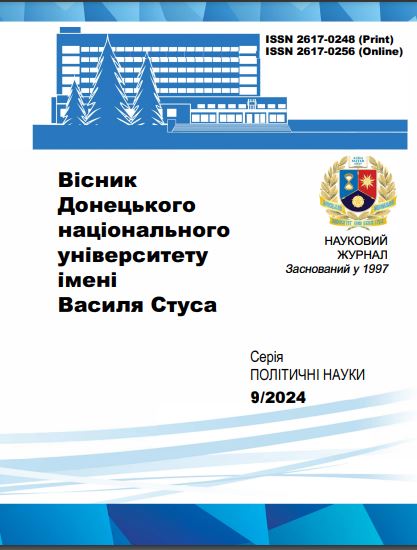Criteria for the study of collaborationism and their application to the analysis of the Ukrainian case in the conditions of war
DOI:
https://doi.org/10.31558/2617-0248.2024.9.1Keywords:
accommodation, collaborationism, collaboration activity, occupied territories, mimicry, reintegrationAbstract
Collaboration activities are the subject of research in various scientific fields, which make it possible to identify universal criteria of collaborationism that demonstrate its various forms. This allows for a deeper and more detailed analysis, taking into account the specific context in which collaborationism manifests itself, as well as suggesting a possible logic for future research on this phenomenon in order to develop practical recommendations for solving various problems in the state related to it. Such criteria can be useful for comparing different cases of collaborationism and studying its impact on social, political and economic processes in different regions and conditions. Since 2014, after the annexation of Crimea and the occupation of parts of Donetsk and Luhansk regions by the Russian Federation, Ukraine has faced and continues to face many economic, social, cultural and other challenges, one of which is collaborationism, a phenomenon that was actualized at this time. With the outbreak of a full-scale war in 2022 in Ukraine, it has gained particular importance and, in turn, in the Ukrainian scientific discourse, has identified interrelated problems: security, legal, moral and ethical, cultural and ideological, national, educational, and others. Their detailed analysis, as separate criteria of collaborationism, will allow us to consider in more detail its manifestations in war conditions, to distinguish its types and various types of cooperation with the occupiers, to differentiate social mimicry as an indicator of the behavior of the occupied population, to identify gaps in the legislation on liability for collaborationism, to determine the consequences of collaborationist activities in the occupied territories of Ukraine and ways to overcome them.
References
Рубащенко М. А. (2023) «Колаборація», «колабораціонізм», «співпраця», «колабораційна діяльність»: історичний та кримінально-правовий виміри термінологічного плюралізму. Проблеми законності. Вип. 162. С. 131–156. https://doi.org/10.21564/2414-990X.162.285405
Чальцева О. (2022). Категорія «колабораціонізм» як багатокомпонентний наратив в умовах війни. Політичне життя. №2. С.55-60
Hechter M., Vidal-Aparicio O. (2011).Dynamics of military occupation. The handbook on the political economy of war / Coyne C., Mathers R., editors. Cheltenham, Glos, UK: Edward Elgar. P. 432-453.
Шайкан В. (2005). Колабораціонізм на території рейхскомісаріату «Україна» і військової зони в роки Другої світової війни. Монографія. Кривий Ріг: Мінерал. 466 с.
Edelstein D. (2008). Occupational hazards: success and failure in military occupation. Ithaca, NY: Cornell University Press. 235 p.
Marcum A. (2015). To Dictate the Peace: Power, Strategy, and Success in Military Occupations. Ph.D. dissertation / University of Maryland. Maryland, USA.
Lammers C. (2003). Occupation Regimes Alike and Unlike. Organization Studies. Vol. 24, No. 9. P. 1177-1202. URL: https://doi.org/10.1177/0170840603249002
Зубченко О. (2022). Колабораціонізм на тимчасово окупованих територіях Півдня України: соціологічний аспект. Вісник НТУУ «КПІ». Політологія. Соціологія. Право. No 3(55). С. 15–23. https://doi.org/10.20535/2308-5053.2022.3(55).269530.
Лобанова А. С. (2016). Соціальна мімікрія в умовах кризи та гібридної війни: пошук емпіричних показників. Вісник Луганського національного університету імені Тараса Шевченка: Соціологічні науки. № 5 (302), травень. С. 55-70.
Hayes C. J. Н. (1968). The Historical Evolution of Modern Nationalism / C. J. Н. Hayes. 3rd ed. New York. P. 164–224.
Armstrong J. (1968). Collaborationism in World War II: The Integral Nationalist Variant in Eastern Europe. Journal of Modern History. Vol. 40. No 3. P. 396–410.
Poliszczuk W. (2000–2003). Integralny nacjonalizm ukraiński jako odmiana faszyzmu. Toronto. T. 1–5.
Зайцев О. (2013). Український інтегральний націоналізм 1920–1930-х років: Нариси інтелектуальної історії. Київ: Критика.
Міністерство з питань реінтеграції тимчасово окупованих територій України. URL: https://minre.gov.ua/2024/06/06/zatverdzheno-zminy-do-pereliku-terytorij-na-yakyh-vedutsya-velysya-bojovidiyi-abo-tymchasovo-okupovanyh-17/
Закон Украіни «Про внесення змін до деяких законодавчих актів України щодо встановлення кримінальної відповідальності за колабораційну діяльність». URL: https://zakon.rada.gov.ua/laws/show/2108- 20#Text
Виживання чи злочин: як Україна карає за колабораціонізм. Аналітичний звіт (2024)./ Синюк О., Депутат Д., Вишневська І., Волковинська В., Червонна В., Єлігулашвілі М.; ред. Луньова О. Київ.104 с. URL: https://zmina.ua/wp-content/uploads/sites/2/2024/07/colaboratz_print_ukr.pdf
Щербань С. (2024). Аналітичний огляд результатів соціологічних досліджень щодо ставлення суспільства до колабораціонізму та правосуддя щодо нього. ГО «Харківський інститут соціальних досліджень». Київ. URL: https://www.helsinki.org.ua/wp-content/uploads/2024/08/Analitychnyy-ohliad-rezultativsotsiolohichnykh-doslidzhen.pdf

